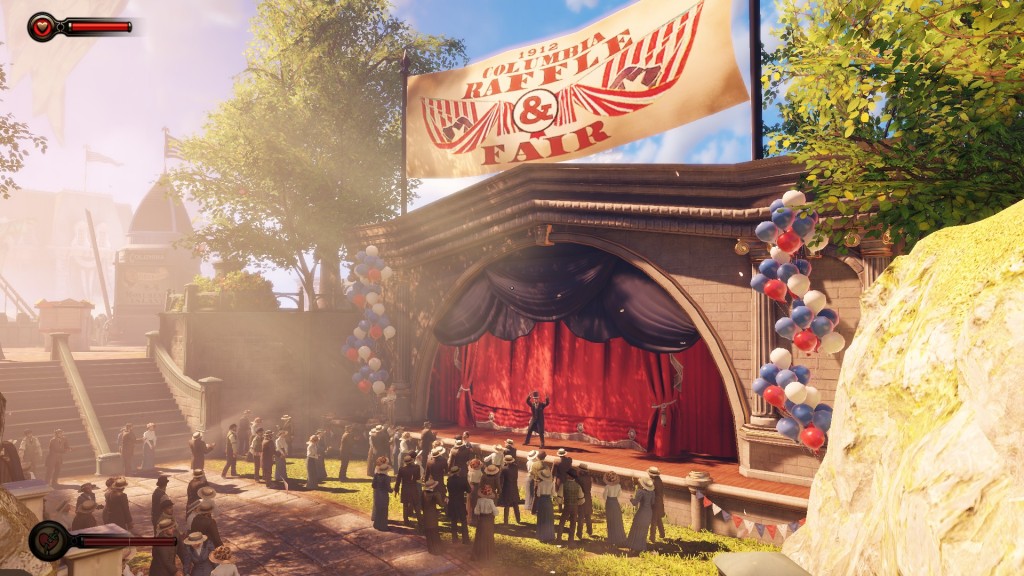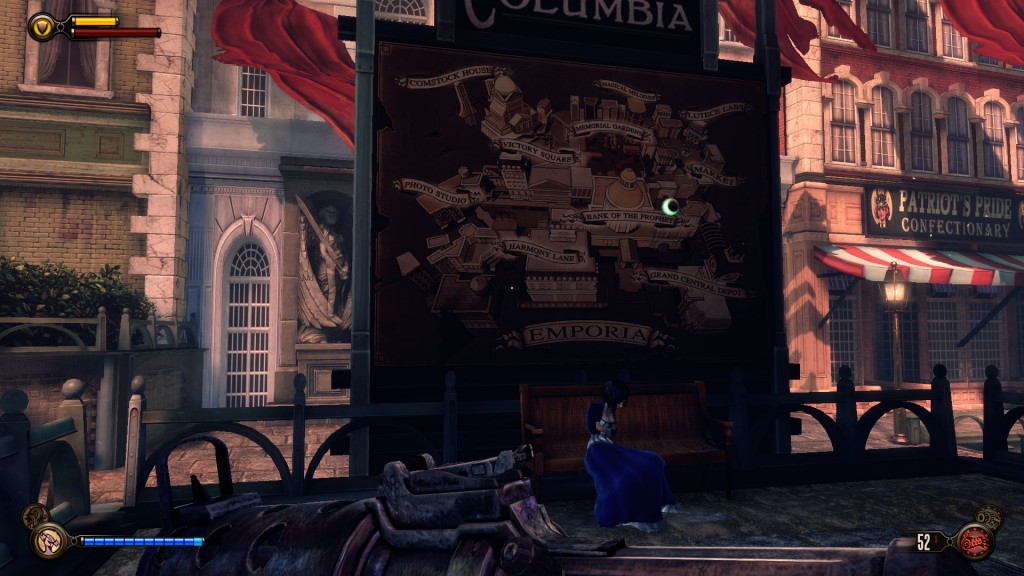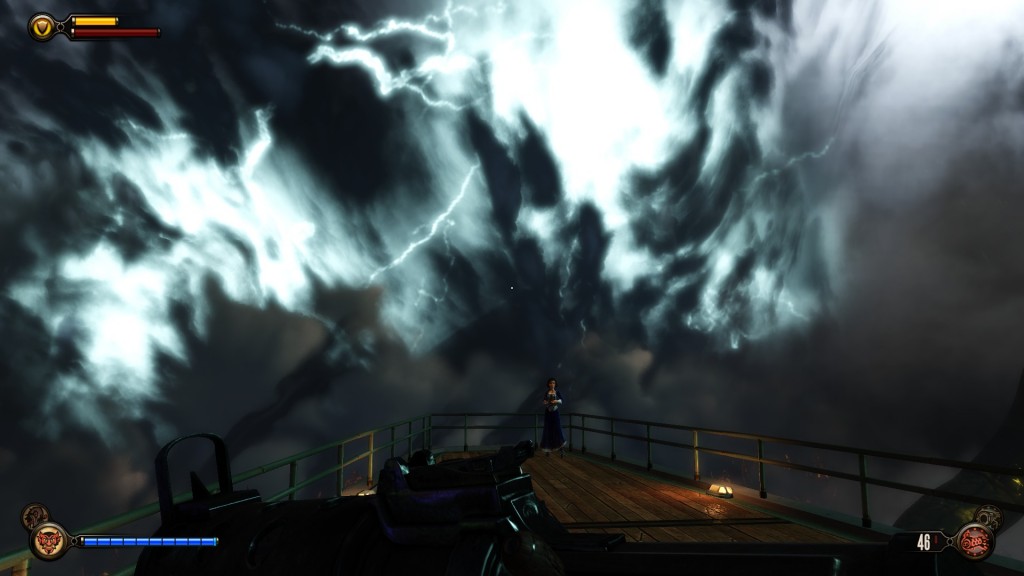- BioShock Infinite: The Verdict
- Wiping away debts: the BioShock Infinite spoiler post
Since so much of my response to BioShock Infinite is wrapped up in the details of the game’s story, I thought it deserved a short follow-up of its own. As such, there will be extensive spoilers ahead – don’t read this post if you haven’t finished the game!
Ready?
While there are multiple plot threads in BioShock Infinite, its narrative is strongest when it focuses on one: the redemption of Booker DeWitt, the butcher of Wounded Knee, the man who sold his own daughter to cover his gambling debts. Conversely, it’s weakest when it allows itself to sidetrack, and there is no sidetrack more problematic than the class/racial war between Comstock’s Founders and the Vox Populi. The issue with this subplot, which takes up BI’s entire middle act, is twofold:
1. It’s a clash of caricatures: smug oppressors versus mass-murdering revolutionaries. Comstock himself is a glorified doomsday cult leader, and his followers aren’t just racist; they’re so grotesquely racist that they stone mixed couples and build temples to John Wilkes Booth. The Vox, meanwhile, slaughter almost every civilian in the prosperous part of town, and at one point a Vox leader even gives orders to shoot anyone wearing spectacles! They are so extreme that the only real message they convey is, “Two wrongs don’t make one right.”
2. While it’s important to the setting, the subplot is only tangential to the Booker/Elizabeth arc. We learn more about our heroes from how they respond to the Vox uprising, with Booker’s scepticism contrasting with Elizabeth’s initial starry-eyed idealism. Meanwhile, the various fates of Chen Lin – and the alternate Booker, who became a martyr for the Vox – are an early (and skilful) exploration of parallel timelines and how differently one’s life could unfold. Still, in a game that compressed so many vital revelations into its last few minutes, was this extended middle act the best use of story time?
So what did BI do right with its redemption storyline? At its heart is an idea I really like: that love for his daughter leads Booker to become a better man. (Contrast the alternate Booker/Comstock, who sought absolution without repentance and ended up a vicious hypocrite.) His affection for Elizabeth is utterly believable: she is an appealing character, endearing in her love of music, brave enough to fling books at an intruder, kind enough to instinctively rush to a wounded man’s side. And I love the milestones that mark both the growth in their relationship and Booker’s slow change of heart. Take these loading screen quotes, early in the game:
“My debts were many. My options were few.” (The Lighthouse)
“I’ve been told to tell the girl whatever she wants to hear, so long as she comes along.” (Battleship Bay)
This is a man for whom protecting Elizabeth is a mere job, a man who plays on her yearning to see Paris to make her “come along”. What a contrast to this quote, from BI’s final act:
“There’s a debt I owe the girl, and if it means paying her and not the man in New York, so be it.” (Comstock House)
Indeed, Comstock House and its surrounding events deserve special mention. They contain an utter non sequitur (three boss battles against banshee Lady Comstock?!), but it’s here that BI remembers about the Booker/Elizabeth/Comstock plotline. The actual Comstock House sequence, in which Booker storms the building in a bid to rescue Elizabeth, is one of the game’s most effective – Booker’s desperation mirrored my own as I ran lower and lower on ammo, a clever (and alas, solitary) example of gameplay and story integration.
Even before that, two scenes show how far Booker and Elizabeth have come. The first is when Songbird snatches Elizabeth away: she doesn’t plead for her life. She pleads for Booker’s. The second is my single favourite story moment in the game: when Booker tries to dissuade Elizabeth from disinterring Lady Comstock’s remains, and when that fails, insists on doing it himself. In this instance, Elizabeth is no longer precious cargo to be delivered to New York. She’s a friend, and he now feels responsible for stopping her from doing something she’ll later regret. And regret is an emotion that Booker knows all too well.
That is what I like about BioShock Infinite’s story. It’s too heavy-handed to work as political/social commentary: I suspect this was an early idea (remember the 2011 trailer that depicted a very different Zachary Comstock?) that the developers couldn’t bear to cut, even as it fit less and less with the rest of the game. But it works on a deeper, emotional level, as a story about Booker, Elizabeth, and their journey together. What can change the nature of a man? BI’s answer is regret, the power of (familial) love, and hope for redemption. It’s a simple message, but a powerful one. For – to paraphrase Comstock’s archangel – if grace is within the grasp of one such as Booker DeWitt, how can anyone else not see it in themselves?
Resources
What happened during BI’s time-bending story? This chart offers a good explanation.
Transcripts of all Voxophone recordings
Interesting article #1: Erik Kain, at Forbes, rounds up several responses (including his own) to BI’s violent, combat-centric gameplay. Some very good points there.
Interesting article #2: Kieron Gillen’s take on the story, at Rock Paper Shotgun.
Note: the above comments are based on a review copy supplied by the game’s publisher, 2K Games.
Discover more from Matchsticks for my Eyes
Subscribe to get the latest posts sent to your email.



















1 thought on “Wiping away debts: the BioShock Infinite spoiler post”